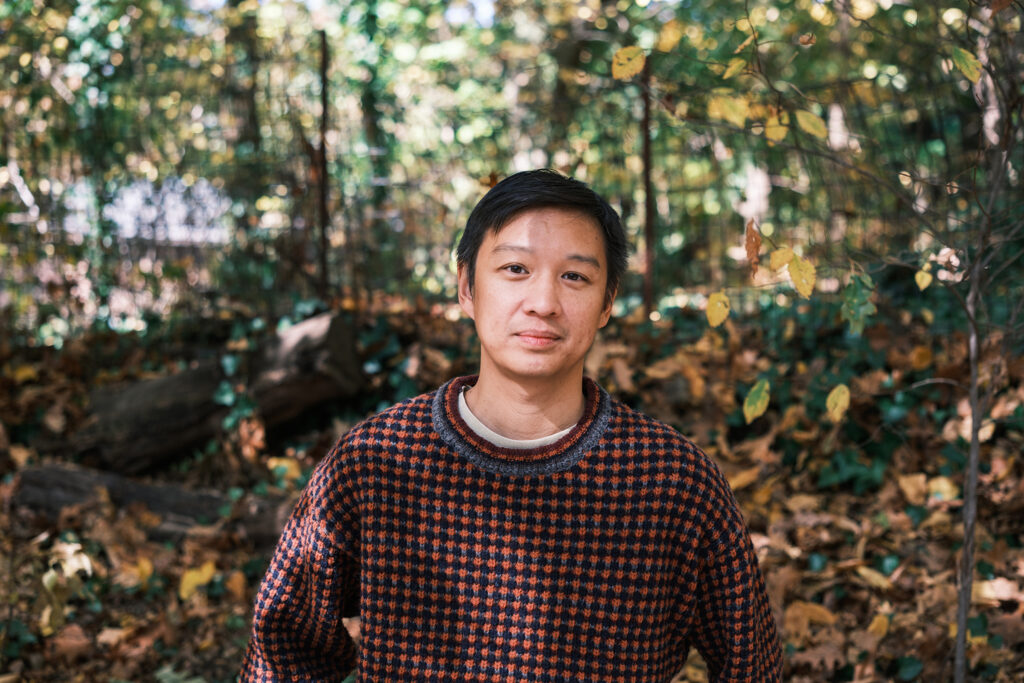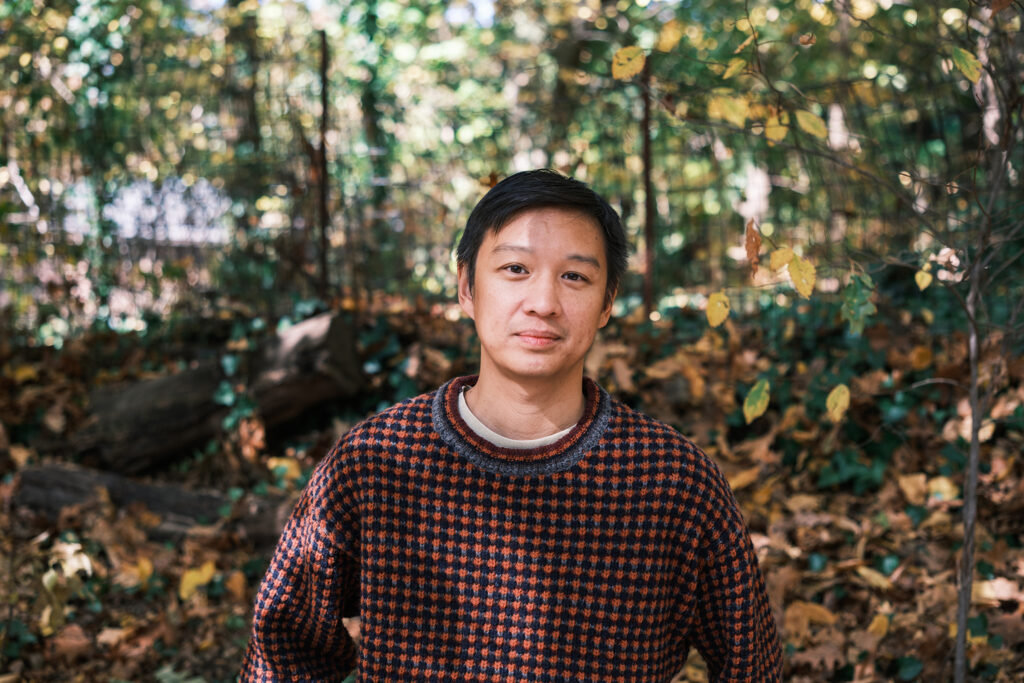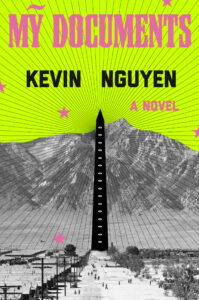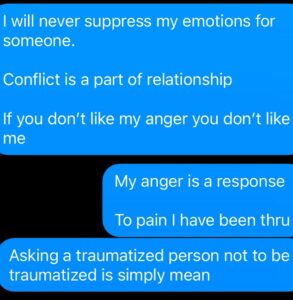Author Spotlight: Kevin Nguyen, ‘Mỹ Documents’


After a string of random attacks by Vietnamese Americans, the president signs an executive order demanding their immediate incarceration. A mirror and uncomfortable echo of World War II’s Japanese Internment, Viets are forced into camps, detaining half of one family. While their jobs at Google and a news company, Alvin and Ursula are exempted, but their half-cousins aren’t so lucky. Along with their mother, Jen, an NYU freshman and Duncan, a high school athlete, make their way into the camps. But Jen finds a way for the horrors of camp to get to the outside world — her cousin, Ursula, whose journalism (and advancing career) relies on Jen’s experiences — and struggle.
Funny, momentous and all too close to comfort, The Verge editor Kevin Nguyen’s second novel asks striking questions about the nature of America, journalism, and who gets to profit off whose stories.

Congratulations on your new novel! It feels like this and your first, New Waves [March 2020], have been published at such strange times in American history. How are you feeling about it?
I know, I’m starting to think I should just stop writing books. Maybe they’re the problem. I think this one feels a little different, because it’s speaking so directly to people about this moment, which wasn’t necessarily the intent when I started writing.
Mỹ Documents is obviously very timely. When did you start writing the book and did it shift along with the American political landscape?
I started writing it in 2018, and I wrote it on and off over five years, I believe. I wasn’t necessarily thinking about the contemporary political landscape — it’s not, like, a Trump book or a Biden book — but it is based on a lot of historical realities I was researching, and a lot of things happening in current-day. But it’s less tied to politics and more to the way this country treats certain people.
It can clearly be mapped to the Japanese internment camps of the last century, but it’s never too pedantic or heavy. Was humor a conscious choice?
Yeah, I thought about the concept of the book, which is, what if Vietnamese people were detained in camps in an echo of Japanese incarceration. And I imagine characters who are younger, in the camp, and what they would think about. On one hand, there’s the existential dread, and on the other, I think they’d be really annoyed they couldn’t look at their phones anymore. So I think the gap of that experience felt both honest and funny. And that was the energy I wanted to put in the book.
So, a connected network of Vietnamese attackers terrorize American cities, which leads to a general fear of the entire nationality. I’m curious what inspired this.
It was inspired by another dark thought I had that was kind of funny — I feel like if domestic terrorism was perpetrated by non-white people, the US would actually take it seriously. I actually think the thing that happens in the book that instigates tension isn’t more dramatic than gun violence in this country. But we obviously don’t take those things seriously as a government.
I also thought it was really interesting how you described the bureaucracy of the internment camps — it’s as simple as Congress passing a bill for Vietnamese detainment. And if anything, it’s marketed as pro-American.
Yeah, it’s been interesting watching people call this book ‘dystopian’ or ‘speculative,’ and I don’t think those are necessarily wrong genres for it, but usually in fantasy there’s something in the world that exists or is different to enable a circumstance. This one’s just enabled by policy. Japanese people were incarcerated from one executive order signed by FDR, and we now have a president who signs executive orders constantly. I’m not saying something of this scale is going to happen to Vietnamese people or any other population, but we’re never that far from it being allowed.
Even though the book is notably vague in when it takes place, it is preoccupied with John McCain, who you include some quotes from and write about later on. Why was he a person of interest for the novel?
That’s probably the most political thing that was in my brain while I was writing it. During the first Trump administration, there was so much conversation about how we used to have ‘Good Republicans’ and McCain is always held up as an exemplar of that. Maybe he is preferable to Trump, but his politics were still the ones that dehumanize communities, like Vietnamese Americans. The quotes in the book I use as epigraphs are real. He called Vietnamese people ‘gooks,’ on the campaign trail. He didn’t apologize; he still felt that way until he died.
I really enjoyed the satirical elements later on, like when Amazon or Nike sponsor the camps and fit them with training centers. It kind of matches how absurd and ridiculous American life has become.
Yeah, it’s not one we’ve necessarily surrendered to rather than embraced. I think we’re all coming around to this now, but the amount of surveillance we’ve willingly given ourselves to, and for what? For cheaper shipping or free apps? It’s like we made some kind of bargain and we got the short end of the stick.
I really enjoyed the two writers in the novel. Jen, who is interned, joins an underground network of radical newspapers and is a little miffed that she has competition in the space. Meanwhile, she acts as a source for Ursula, her half-sister, who uses Jen’s writing and photos as a way to report on the camps, but also advance her own career. Did you have any particular inspirations for these characters?
I want to caveat this by saying that I work in journalism because I believe in a free press, I believe, earnestly, that journalism can speak truth to power. At the same time, journalism’s constructs give the journalist a lot of power. The ones who have often succeeded are power-seeking, even as they do good work. I wanted to embody, especially, in these two characters, that even if doing journalism is a moral good, you can get at it in immoral ways. I just like that ambiguity between the two of them, and they’re ambiguities I personally feel in this field.
Ursula’s motivations were especially interesting. While she enjoys notoriety and book deal and TV appearances for her reporting, Jen, who she relies on, remains at camp. I enjoyed that she felt bad for using her, but not bad enough to stop — she’s convinced she’s acting in favor of the truth.
Yeah, I think it’s unclear — I feel we operate as human beings, thinking about our friends and family as a smaller unit, then the ‘greater good’ or ‘greater world.’ There’s obviously such a tremendous gap there, but for a journalist like Ursula, where you convince yourself the most important thing is the greater good, it certainly warps the way you think about your family. It’s suggested in the book that her reporting is quite influential and important. Does that justify the way she treats her sister?
There’s also the idea of complicity in the book. Jen gets close to one guard, Hugo, who she sees the humanity in despite his involvement in camp. And when Urusula interviews a radical who supplies the camp with reading and entertainment material, he says he’s just doing his job. What made you want to write about this?
I think this and my first book are strongly novels about the roles of work. And that’s a broad definition, but I think humans like to be productive; we’re always making things. Maybe not to put too fine a point on it, but you either make art, something productive or interesting, or you make garbage. I like the idea that even when this community of people are detained, they’re still creating things. There’s a lot of art making and storytelling in the book, not all of it is supposed to be great art, but I think the value of it for the characters is just the act itself.
You write that journalism goes through cycles, and that just because something is happening, doesn’t mean it’s newsworthy. The violence at camp still occurs, but since it’s no longer new, it can’t be a story. And unfortunately this idea has only been replicated.
I think this is just always a problem about the idea of news. I don’t have a solution for this, because I assign stories at my job all the time, and you want there to be something that is actually different and new — that’s the goal. But the reality is that things just keep happening, and as you report it the first time, it becomes increasingly hard to write about it again, and it’s less interesting for a reader. What is that balance? Especially now, I feel like the Trump administration just keeps ignoring all of these court orders, which is a huge fucking deal. But how many times can you say that over and over? I don’t have a good answer for that, and that’s probably the strength of this administration, that they just know they can barrel ahead.
To talk about craft for a second, I was fascinated by your 7-pronged writing routine you published in The Verge. I use my Notes app and Scrivener, and then I go at it.
I guess in writing that piece, it wasn’t to recommend seven apps, but to talk about how, at least for me, writing needs different things at different times. I think moving things around different environments is helpful to the brain, but I’m also very resistant to the idea of workflows, or making anything easy on myself. Constantly introducing friction into a work has been very fruitful for me.
Finally, what are you working on next?
Right now I’m working on a biography of the composer Ryuichi Sakamoto. I think it’s technically not announced, but it’s a lot of work and I’ve been talking to people. Maybe you can see in the back, I just have a bunch of [books], a lot of them are in Japanese, which I don’t speak, so I have to translate them. That’s the next big thing — I’m at the beginning of it, doing lots of interviews and readings. I’ve barely put anything on the page yet, but it’ll be fun to do a nonfiction thing for a bit.
Mỹ Documents is out now.
The post Author Spotlight: Kevin Nguyen, ‘Mỹ Documents’ appeared first on Our Culture.





